Herd
Delusional, and sadly typical
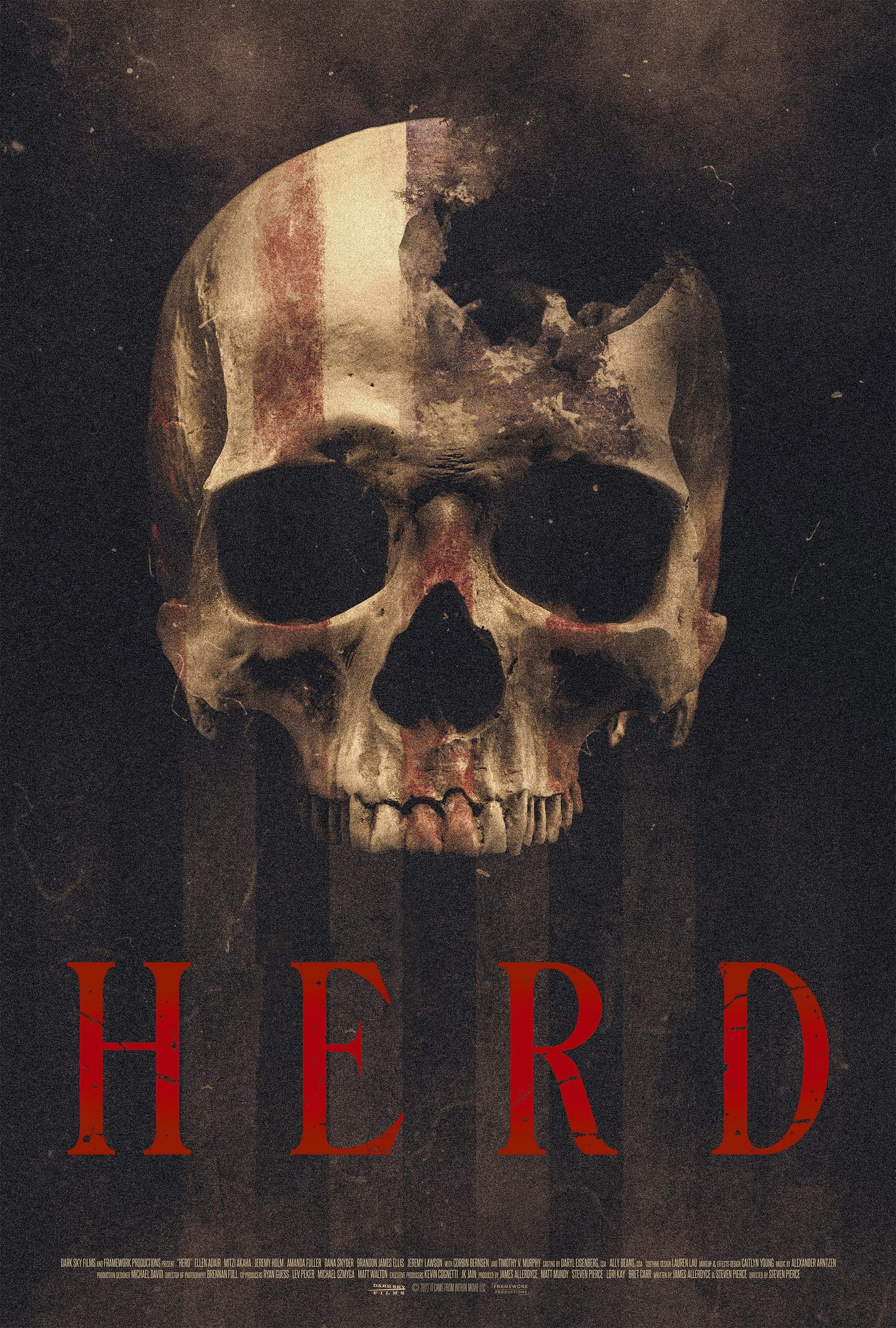
A young woman running from her past ends up getting stuck in it, trapped in the small rural town of her birth, caught between an angry zombie outbreak and a pair of warring local militia groups.
Herd is set deep in an anonymous Iowa/Missouri-looking stretch of flat river lowlands and cornfields, basically the area of rural Midwest America known as “Real America” to the bigot MAGA folks. Wherever it is specifically, it's clearly the kind of middle-of-the-country "fly over" area that is already a dangerous place to be if you’re a stranger, and is even more so if you‘re a stranger who isn’t white, or male, or straight, or cis-gendered, or Christian, but in this film, those gravel road grids, endless fields, twisting river valleys, and little pink houses for you and me are now infested with the living dead! Gasp! And this time, that’s not meant as a metaphor for the people who grew up there and never left either! This time it means… zombies.
Maybe.
Right away, the first problem I have here is that it’s not really clear if Herd is an actual zombie film or not. I’m gonna vote no… most likely not? Because at first, it seems like it might be a real zombie film, instead of a fake zombie film like 28 Days Later, but then as the film goes on, it's just unclear as to whether or not the monsters in this movie actually adhere to the Romero Rules or not. Sometimes, it seems like these boil-covered creatures are actually living people who are infected with a virus, like in 28 Days Later, but at other times... they do look pretty dead.

But like I said, while watching the film, it’s unclear. Yeah, they go hard on the make-up, as this is obviously something the filmmakers couldn't wait to throw their all into, as they're obviously horror movie fans, but as for the monsters themselves, how they become one, what they do and why, or even how they die, it's all unclear. This is mostly due to the fact that Herd is pretty sloppy in general when it comes to its storytelling, but it's also because, despite an initial glut of encounters with the monsters, for most of the film, they’re barely in it.
Someone said online recently that there are really only three types of zombie stories: The politically-minded ones where humanity is the real bad guy, the gothic and surreal splatter-fests, and the EC comics-like ghoulish comedy-horrors. And I agree with this, so I'll apply it here: If Herd really is a zombie film—which I am pretty sure it isn't—it would be the first type.
So, the story goes like this...
At some point before the film starts, the local rural area where the film takes place—or possibly the entire world, this is also unclear—has experienced an outbreak of people turning into mindless, lumbering, bloodthirsty monsters. This naturally led to a general breakdown of society.
Now, to be fair, I don't think you can really fully blame our main characters, girlfriends Jaime and Alex, for not noticing such a nuanced change on the local level, as lumbering and mindless isn't exactly a stand out trait in these places, but still you can blame them for deciding to go camping in this ugly backcountry of weed-choked, mosquito-infested river lowlands… something that seems like it’d be a terrible idea even without the zombies.
Adding some gas to this out-of-control fire of a bad idea, there’s obviously some kind of issue lying between this couple. It soon becomes clear that the reason they are even out there in the first place is because, back in the big city where they live, they had tried to have a child together, but the baby died, and now their once very close relationship is fracturing. This camping trip is an attempt to reforge those old connections. But then Chekhov's Canoe finally tips over, a bone is broken, and the pair is set on an inevitable bloody confrontation with a bunch of vicious rednecks and ravenous monsters.
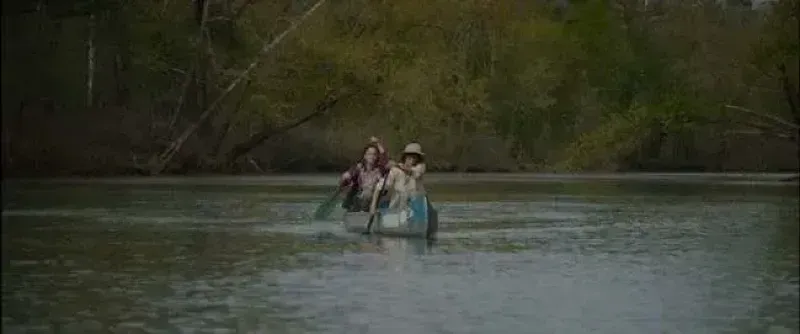
Then, it turns out that Jaime is actually from the nearby small town that she and Alex end up taking refuge in, and it turns out even more that she apparently never wanted to return to this small town. This of course makes you wonder why the hell she didn’t just choose literally anywhere else in the entire world for their camping trip? And seriously, the fact that she doesn't want to have anything to do with her family or past aside, why would you choose to go camping in an area that looks like it’s always on the edge of winter, and is nothing but mud, bugs, dead bushes, dead corn fields, and old dog turds?
So, Jaime didn’t want to come home for two reasons. One, because of her drunk asshole bigot militia-nut of a father. And two, because she didn’t want the rest of the shitty little small town that she left behind long ago to know that their favorite former high school star athlete was actually a lesbian all along.
I totally get Jaime’s reticence to return home. Due to a lifetime of experience, Jaime understands that despite the down-home country ways, despite their smiles and manners, despite their “ma’am-ing” and their “Ms. Mayella-ing,” despite their outwardly pleasant demeanors, these incestuous and ignorant little communities are always a hair's breath away from violence, especially if they're ever startled or confused, and all while being heavily armed too. She understands that these places are far more dangerous than any zombies would ever be, and often at the drop of a hat too. Jaime understands that being a sundown town is the default setting for the majority of white rural America, which basically makes them No Go Zones if you're different, or just not from there, and that while they might welcome you in at first, sooner rather than later, like an untrustworthy dog raised on shitty beer and boots to the ass, they're going to turn and bite you.
She knows this because she already has some deep, deep scars, which is why she left this town in the first place. So, right away, Jaime can see their glares, she can see them sneer and whisper, but her girlfriend Alex isn’t from the same places that she is. It's never stated, but it seems like Alex is from the city, and even worse, on top of that, she’s a privileged white girl, so she naturally assumes that she’s able to go anywhere and be safe, blissfully oblivious to the danger that surrounds a lesbian couple who have ended up stuck in rural America, inside an isolated machine shed, with a bunch of methheads and evangelicals speaking in tongues, especially during what could reasonably be said to be an apocalypse as zombies scratch at the walls. And because Alex is incapable of recognizing the danger she’s standing waist-deep in, coupled with the fact that she’s already shown herself to be a bit of a dumbass during their canoe trip, it’s obvious what’s going to end up happening here, and like a microcosm of the last 20 years in this country, that ends up becoming Jamie's problem to bear.
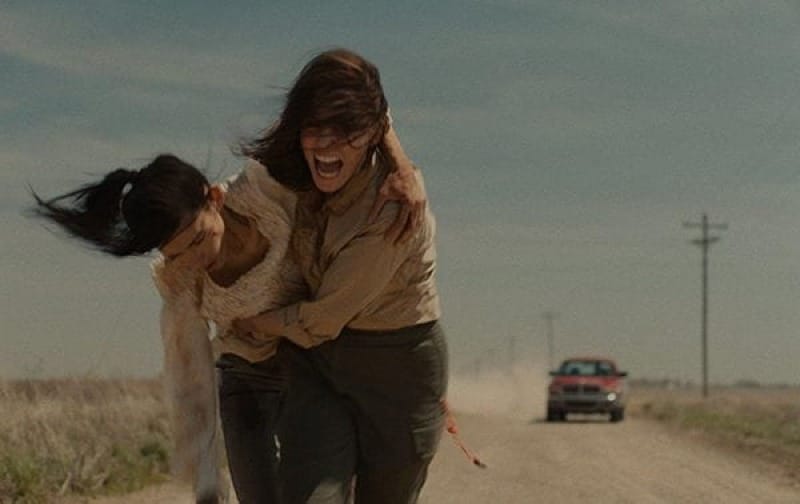
Then, y'know... it's all hordes of zombies and armed rednecks.
So yeah, that’s the whole thing. Due to some unfortunate and unforeseen circumstances, some of which are due to a monster outbreak, sure, but some of which are 100% due to her having chosen a campsite about a mile and a half from the childhood home she claims she never wanted to return to, Jaime is back in town, an injured girlfriend in her bed, a bunch of monsters at the door, and a ton of asshole rednecks ready to go to war against the zombies and each other.
so, surprise, suprise, the whole thing ends in a hail of bullets.
God bless America.
Also, in my personal niche-nerd "You know what really grinds my gears" thing, instead of just calling the monsters "zombies" or "the dead" or something easy like that, Herd's creators, just like every other shitty zombie story, spent too much time coming up with a stupid and unnatural-feeling nickname for them. Here, they call the zombies… Heps. I assume because the virus is somehow related to Hepatitis—probably Hepatitis Z, amirite?—but because Herd is generally pretty sloppy with their storytelling, it isn't really explained, or maybe it was in a newscast on one of the TVs going on in the background. Either way, it's pointless and unnecessary, and only ends up feeling too try-hard. It's like wasting time in a superhero movie explaining why a superhero puts on a silly outfit in the first place. It's what they do, all right? We get it. We're willing to accept it. This is a zombie movie, just call them zombies, it's okay if the people in this world have no reason to come up with that name, or that using the word "zombie" in your movie potentially implies that zombie movies exist in the characaters' world too, no one cares, it's all right. Stop wasting time on shit that doesn't matter.
Because this wasted time could've been better applied on their script instead, perhaps even fixing issues like… why would Jaime camp next door to the one place in the world she never wanted to return to? Or maybe they could've addressed how she makes such a spectacle of the emotional pain and hurtful memories she has of her asshole father, only for her to then show up at his machine shed and discover that he died before she even got there, which basically cuts off the entire storyline? It just... makes no sense. Why would you do that? Is that a leftover storyline from a previous version of the script that never got deleted? And if that was a decision you made, then why not just have Jaime and Alex camp somewhere that they have no old history with? They would have still been outsiders, so the basic set up would've been the same. And if you did that, maybe they could've choosen a place to camp and relax in that didn't look like the dried up ass end of tornado alley...?
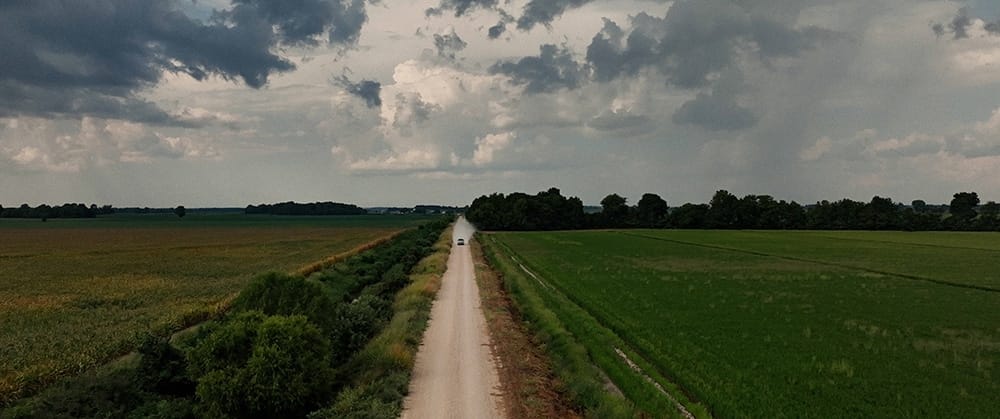
Anyway...
A surprising COVID metaphor—if not a somewhat murky one—where an outbreak and a storm of government misinformation leads to a wildfire of infection, a pile of dead bodies, and a bunch of out-of-control militia (white people) vigilantes driving around in shitty pickups shooting people and generally making everything worse, there is also the usual disappointing strain of White Centrist bullshit here.
Herd’s main themes are all half-baked attempts to say something about how “bipartisanship is the way,” and how “we should all stick together, yes, even with the bigots” and “oh, how sad it is that the big city liberals can’t just get along with these good salt of the earth small town rural people, yes, even the bigots.” And while this is always disappointing, and always exhausting--the all too prevalent result of yet another set of white creators too concerned with making excuses for their bigot friends and family members, then they are with confronting them and cleaning up their own houses--at this point, it’s sadly not all that surprising either anymore. Honestly, I'd be more shocked if a film like this, made by the people it was made by, didn’t contain this kind of horseshit, right?
The filmmakers very clearly think they’re saying something about America with this film, that this film is an indictment of our society. And in their defense, they almost do say something. Almost. There's an especially good lesson near the end for what happens when you give these kinds of people the benefit of the doubt.
But still, it’s also obvious that the filmmakers are too chickenshit to just say outright what they are clearly trying to imply here, and as a result, Herd ends up hobbled not just by the usual kinds of delusions of grandeur that filmmakers often harbor when it comes to the lofty brass ring their low budget projects are reaching for, brass rings they almost always fall short of, but also because the film works too hard to be vague about who these people really are, how they talk, and what they think, e.g. the militia types make several references to “bureaucrats” throughout the film instead of using the actual MAGA-speak used in real life. This ends up feeling kind of like when a football video game doesn't have an NFL license, so all the fake team names just highlight how fake the whole thing is, and that's despite the fact that it's a zombie film.
Or at least, possibly a zombie film.
Either way, when it’s all said and done, everything in this film, everything the characters claim to care about it, was destroyed due to the rural populace’s cruelty and entitlement, so at least there’s that. At least there's a kernel of truth, even if it’s trampled by a laughably half-assed 11th hour attempt to lament the horrors of gun violence. Oh, the humanity! Look at them all shooting wildly, so dramatic as they fall, families torn asunder! So sad, this violence… so sad.
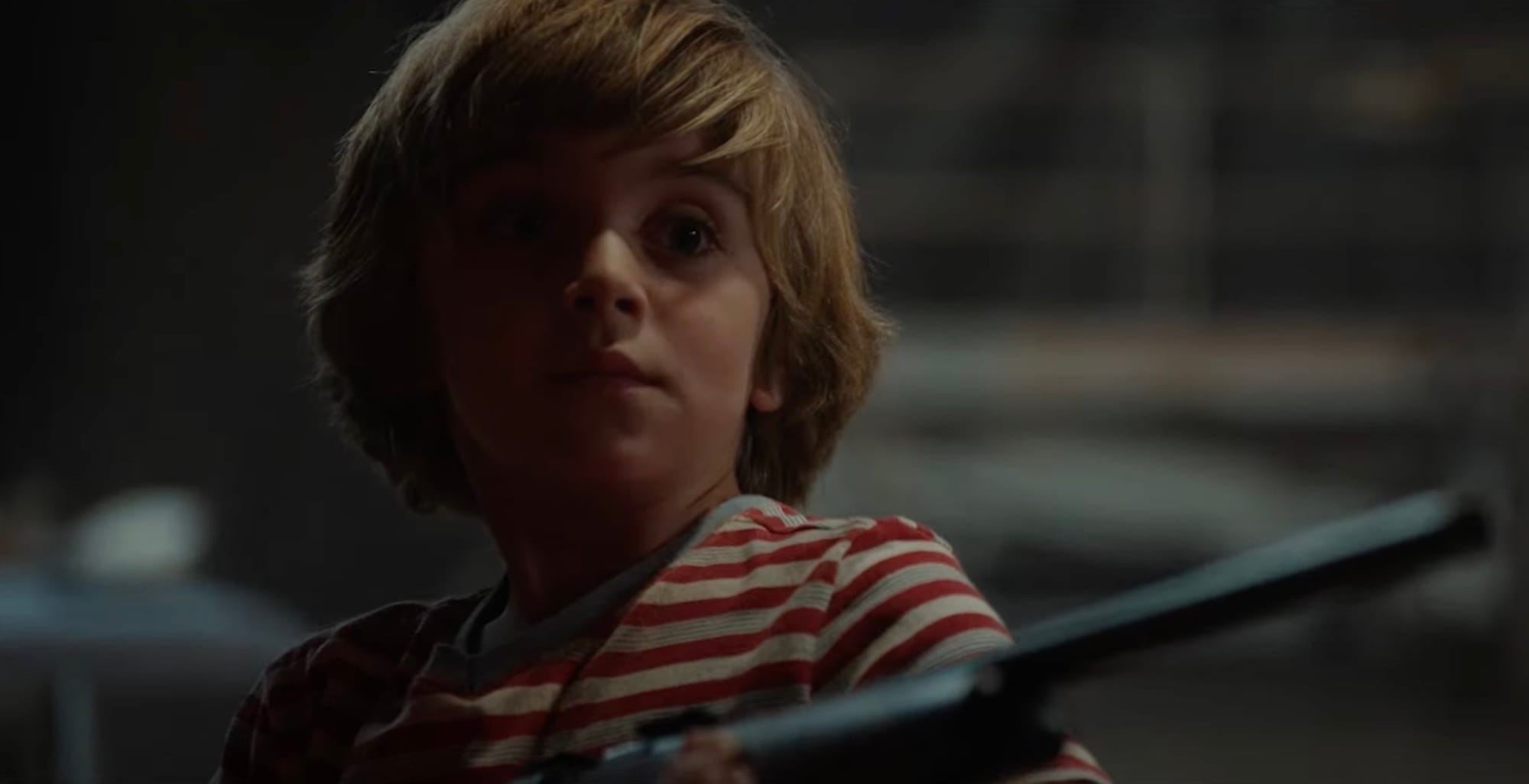
To the film’s benefit, the lighting isn’t bad, but the camera work is, as it seems mostly handheld, with a lot of cuts and moving around, making everything too muddled, on top of action that is awkward and unnatural to begine with, so on a technical level, there isn't much there either. The make-up is nice, but nothing that stands out. As for the zombies themselves, they are inconsistent in how they move and react, and are mostly governed by the dramatic demands of the script, and like I said, they mostly disappear about a third of the way through the film, until a brief appearance at the end. This all feels like a project that took a long time to finance, and had multiple film shoots, where time and money wrecked continuity, as well as the availability of sets and actors, and the filmmakers finally just had to make a Frankenstein's monster cut out of all the footage they had available.
It's basically just a failure.
Herd is a poorly made film, but it's also one that was honestly never going to be anything else but a poorly made film. You always hope for better whenever you watch one of these things, because while it doesn't happen often, when it does, it’s great. But yeah... that doesn’t happen here.
Pass.
